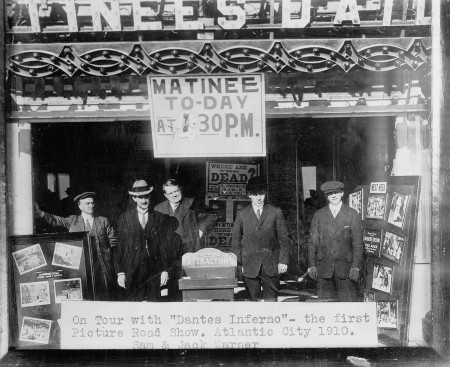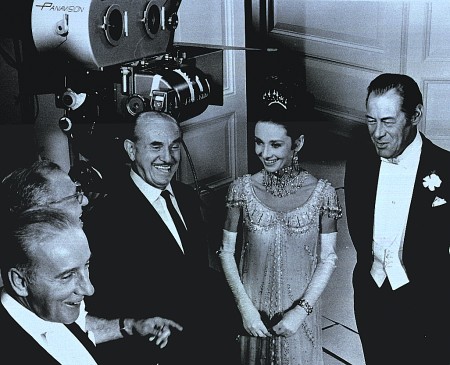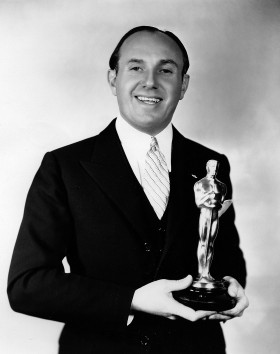|
Facts: Jack Warner, born Aug 2, 1892. Died: Sept. 9, 1978.
Ann Boyar Warner, born Dec 18, 1907. Died March 8, 1990.
Your new movie Jack
L. Warner: The Last Mogul - in a few words, what is it about?
It’s a feature documentary about movie pioneer Jack Warner, one of
the founding fathers of the American film industry, who was also my
grandfather. Being
the real life grandson of Jack L. Warner, to what extent has this informed
your decision to make Jack
L. Warner: The Last Mogul? Jack Warner was
technically my step-grandfather, but I knew him since birth as “Grandpa
Jack” and he treated my siblings and me as his own. We all grew up in
the shadow of Warner Bros.
studio, which when I was as a kid was a magical
place to visit. Not only was my grandfather on the lot running the place,
but my father was employed there as head of Warner Bros. Television. My
mother had also worked at Warner Bros.
in her first movie role playing a
refugee fleeing the Nazis in Casablanca. So, without exaggeration,
the studio dominated my family’s life, and certainly my imagination. My
grandfather died in 1978, and my grandmother in 1990. With their passing,
and the subsequent sale of their opulent nine-acre estate in Beverly
Hills, it was clear to me that an end of an era, in both Hollywood history
and my family’s, had arrived. I wanted to preserve their home on video,
so a friend and I shot footage of the house,and the grounds, which became
the basis for what turned out to be a much larger documentary about Jack
Warner and the history of Warner
Bros. What can you tell us
about the research you did on your grandfather's life? In
1990, when my grandmother died, my knowledge of the studio and its history
was made up largely from the stories I had heard around the dinner table
and the occasional book or documentary I had seen. The stories were mostly
light-hearted and biased towards the studio. In my grandfather’s 1965
autobiography My First Hundred Years in Hollywood, you get a good
dose of his view that everyone was out to cheat him and that the talent
rarely appreciated the careers he had given them. My father felt this too,
but to a lesser degree. So when I started researching the film, I had to
put aside the front office view of things and discover what was really
going on with the people trying to make the movies--and equally
interesting, what was going on in Jack’s life beyond the stories he
shared with me or my father. Meeting former employees and friends was an
obvious first step, but so was reviewing the studio’s files at USC’s
Cinema Library. They have a remarkable collection, which includes my
grandfather’s correspondence and fifty or so scrapbooks he kept from
the earliest days of his career.
 |
You've
made an earlier version of Jack
L. Warner: The Last Mogul quite a few years ago - so what was the
idea behind updating it now, and what do we get now we didn't get back
when? The first version of the film in 1993 was my first
documentary, and over time I realized I could have done more with it. The
interviews with people who had known my grandfather were great and are
irreplaceable. So were the home movies and Warner Bros. film clips. What
needed expansion was how the company evolved from a second-class operation
to become one of Hollywood’s pre-eminent studios. This required going
back into the archives to find supporting material such as newspapers,
historical footage and photos. Visually, the film is so much richer and
full of information that wasn’t in the original release. The updated
version is also mastered in 4K from original sources, so all the images
are pristine, including the film clips. And finally, we re-mastered the
soundtrack, which includes a re-orchestrated score. The film was made to
be projected on a big screen, in a theater, though most people will see it
at home. What can you tell us about your directorial
approach to your story at hand? In telling a story, whether
a documentary or fiction narrative, I think it’s more effective if it
adheres to some conventions of dramatic structure, which I think the film
does. Since making it thirty years ago, I’ve done a lot of
screenwriting, and even directed a feature film—a sci-fi thriller—and
I applied the lessons from those projects to this. I was often asking Don
the editor, who also edited the original, “What does Jack want in this
scene?” Or, “What is blocking his path?” There was usually little
that could be done to answer that question—we were working with existing
material—but it did inform deeper thinking, and sometimes more
imaginative uses of footage. Do talk about the
interviewees in Jack
L. Warner: The Last Mogul for a bit, and how easy or difficult was
it to get them all? Several of the film’s interviewees I
knew as family friends: Shirley Jones, Sheila MacRae, Jean Howard. The
others required more effort to research and contact. When I started in
1990, the internet was barely a thing and no one I knew was using e-mail,
so research meant libraries, letters and phone calls. I had read Neil
Gabler’s book An Empire of Their Own: How the Jews Invented Hollywood, and admired his argument that the film industry was created
by “marginalized men”, outsiders of the power structure and the
dominant culture of the day. With Neil on board, I had a thematic
foundation for the film. Oddly enough, the person I had the most trouble
nailing down for an interview was my father, William Orr. My father had
worked for Jack Warner—his father-in-law—starting just after World War
Two, and had risen to become head of Warner Bros. Television in 1956. Ten
years later Jack fired him without warning, and I think my father was
reluctant to discuss those days. It took three separate interviews before
he opened up honestly about his father-in-law, with whom he had been very
close. Anything you can tell us about
audience and critical reception of Jack
L. Warner: The Last Mogul?
When I finished the film
in 1993, there were a number of prestigious film festivals that invited
it, but no interest from US broadcasters. Not even PBS. Daily
Variety had given it a favorable review, but that didn’t translate into
offers. I don’t know if it was the uneven running time of 104 minutes,
or the insertion of my personal story—briefly— into a Jack Warner
biography that dampened interest. Fortunately, the film sold well
internationally, and I was able to recoup the budget for my investors and
me. In 2006 Warner Bros. included a 56-minute cut down version of the film
as a DVD extra on their re-release of Casablanca, but the film
remains largely unseen in the US Until now. Are there any stories
or anecdotes about your grandfather you'd like to tell that didn't make it
into your movie? And what can you tell us about Jack L. Warner, the
private person? By all accounts, what you saw with Jack
Warner was what you got. There was very little subtext in his
performance. Introspection was not a hobby. He could be insightful into
other people’s behavior, especially if they had a whiff of dishonesty,
but he seemed clueless in how his own behavior might affect others. When I
was about 14, I showed him one of the student films I had made with
friends—a Western that we actually shot on the Warner Bros.
back lot. His reaction caught me off guard: “Don’t be a moviemaker,” he told
me, “play it safe. Become a lawyer.” Enough about your grandfather, let's
talk about you: What got you into the filmworld in the first place, and
what can you tell us about your early career? I loved going
to the studio as a kid to visit my father, then running Warner Bros.
Television. I’d see my grandfather on occasion in his big office that
always felt like the inside of a refrigerator factory. My love for movies
comes from those visits where I could sit on a soundstage all day and
watch a crew craft a scene, working together to capture it on film. In
grammar school I made a few films with a friend who had a camera, then
when I was 13 my grandparents bought me a Super 8 movie camera, and I was
off to the races. Every weekend, through middle and high school, I made
movies—mostly homages to TV shows like The Wild Wild West and
Star Trek, but sometimes an epic like an adaptation of the seafaring
novel Captain Horatio Hornblower. After college I worked for a
special effects company, and then as a production assistant for producer
Roger Corman [Roger
Corman bio - click here], where James Cameron was just
starting his career as an art director on Battle
Beneath the Stars.

Jack L. with Audrey Hepburn and Rex Harrison |
From what
I know, one of your earliest film jobs was on the cult favourite Roger
Corman production Battle
Beneath the Stars - so for the sake of my readers, you just
have to talk about working on that movie for a bit! The
success of the first Star Wars movie inspired low-budget independent
producer Roger Corman to greenlight his biggest-budget movie to date, the
$2 million space opera, Battle
Beneath the Stars. I was hired in late
1979 as an electrician, but switched to being a production assistant. The
film was shot at Corman’s studio in Venice, California, which had been
the former Hammond Lumber Yard. Corman didn’t want to spend the money to
take the sign down, so people kept dropping by looking to buy a pound of
nails or a 2x4. The film is probably most noteworthy for being James
Cameron’s first feature credit as an art director. He was very
impressive, working tirelessly to make the sets look like something. I
remember him applying fast food containers to a spaceship wall to give it
texture. I stayed throughout the production, and admired what a talented
crew could do with a small budget, but Corman’s sensibility was contrary
to the major studio approach I had witnessed growing up. I always
suspected that Corman would rather save a hundred dollars than make a
thousand. You
moved into directing, writing and producing with the original version of Jack
L. Warner: The Last Mogul, right? So what prompted that move? I
always wanted to make my own films, but since leaving film school, I had
been working on other people’s films and TV shows, initially as a
production assistant, then a production manager, and even a stint as a
cinematographer, which I liked. Jack
L. Warner: The Last Mogul was
my first feature-length film as writer/director/producer. Before that I
had started directing TV commercials and industrial films, which offered a
certain satisfaction. My grandparents’ death prompted me to make a film
about something that was very important to me—Jack Warner and my
family’s moviemaking legacy. So
do talk about your past filmwork for a bit!
I wore a lot of
hats early in my career, including as an effects assistant on James
Cameron’s The Abyss. That was an eye-opener to the skill and
resources needed to produce a big-budget, global spanning movie that
Cameron excels at. My goal had been to direct fiction films, not
documentaries, but my Warner film opened opportunities into the world of
non-fiction TV. I made a number one-hour shows for The History Channel,
Discovery, A&E and AMC, which was great, but I never gave up on the
desire to make narrative fiction, which led to my short film Alone
and the sci-fi thriller Cloned: The Recreator Chronicles. Any future
projects you'd like to share? I’m developing a TV series
based on Cloned, the sci-fi feature I made. I also have a big-budget
disaster movie—not as big as a Jim Cameron movie, but it shares his
concerns about the environment. Having done both
documentaries and fictional movies, what are the main differences in
approach between the two, and which do you prefer, actually? When
I was making those historical documentaries for The History Channel and
others, I kept employing elaborate recreations with actors. One day my
producer said, “What are you doing? It’s obvious you want to make
fiction films.” She was so right, and while I would make a documentary
if I sincerely cared about the subject, it’s fiction that I most enjoy
writing and directing. Both forms, it should be said, benefit from a
sturdy dramatic structure. With fiction you construct that in the planning
stage, before filming. In non-fiction it’s often discovered after
filming, during the edit. How would you describe yourself as a director? Others should
weigh in on this. I can only guess at how I approach directing and its
effectiveness. Ideally, I’d like to be a good director for not only the
project, but every actor in it. Communication is at the center, and if
someone doesn’t understand my instructions or intentions, then it’s
me who’s failed. It’s the thing I most worry about when in
production—how best to make myself understood.

Jack L. Warner, circa 1930s |
Filmmakers
who inspire you? When young I was drawn to the work of
English directors—David Lean, Carol Reed, Alfred Hitchcock and Stanley
Kubrick, who wasn’t English but lived there and was in a league of his
own. Later, I took notice of American directors like William Wyler, George
Cukor, and of course Michael Curtiz who directed Casablanca. I
appreciated their clarity of vision, their focus on performance, and
tempo, and the intensity of those films that is more apparent the older I
get. There is an upside to aging—we get to discover films and filmmakers
we ignored when young. Today, I marvel at the work of big action directors
like Christopher McQuarrie (Mission Impossible) or Christopher Nolan
(Batman,
Dunkirk), but also Clint Eastwood for making movies that seem
simple in execution but are packed with moral and emotional complexity.
Television directors are also doing great work, and I’m often touched by
what they come up with, but I find the medium limiting, at least
cinematically. It’s geared towards character over visual storytelling,
and while I enjoy watching many series (Babylon Berlin, Barry,
Evil), I am missing the power that comes from a camera-centric
vision. Part of me longs for the days of silent film, when pantomime met
high art in that new language called “cinema”. Of course, Warner Bros.
killed off that era with the release of The Jazz Singer and the
takeover of sound. Your favourite movies? I
have a terrible confession to make. Since I fell in love with movies while
watching them being made, and making them myself, I did not have the
“coup de foudre”, as the French say, in a movie theater as so many
people did. I had my favorites, and still seek out films and filmmakers,
but I was never infused with the need to see movies like a hungry man who
seeks out a bakery. I liked movies, some a lot: Lawrence of Arabia, Oliver and
2001: A Space Odyssey, as a kid. The Godfather of course, and the important films of the 1960s and 70s.
Kurosawa’s Ikuru is a favorite, as are Kieslowski’s Red
and Blue. What I truly love, though, more than a whole film, are
sequences that show off a perfect blend of visual inventiveness and
emotional resonance that lifts me off my seat. I find it in the silent
classics of King Vidor (The Big Parade & The Crowd) and a
number of musicals, which border on the experimental with their stylistic
depictions of the human heart. ...
and of course, films you really deplore?
There are few
films I hate, except maybe for those that try to be profound by lingering
on a shot far past its usefulness. So called “art films” are sometimes
accused of this. I remember one year in Cannes when the festival showed a
sneak peak of one of The Living Dead movies—just a few
scenes—and you could feel the audience sit up in gleeful anticipation.
It was like a sizzling steak had been tossed into the middle of a vegan
banquet, turning everyone into a carnivore. The comedy Arthur, from
1981, I deplore because it removed the central choice the main character
had to make. In the end he didn’t have to choose between love and money,
he could have both.
 |
Feeling lucky?
Want to
search
any of my partnershops yourself
for more, better results?
(commissions earned) |
The links below
will take you
just there!!!
|
|
 |
Your/your movie's website, social media, whatever else?
My website needs a revamp, so don’t go there. There is a Facebook page that
provides clips and updates, and I encourage people to post their
reactions—good or bad. Anything
else you're dying to mention and I have merely forgotten to ask? No,
this has been very therapeutic, and I expect you’ll send me a bill for
psychoanalysis. Thanks for the interview!
|